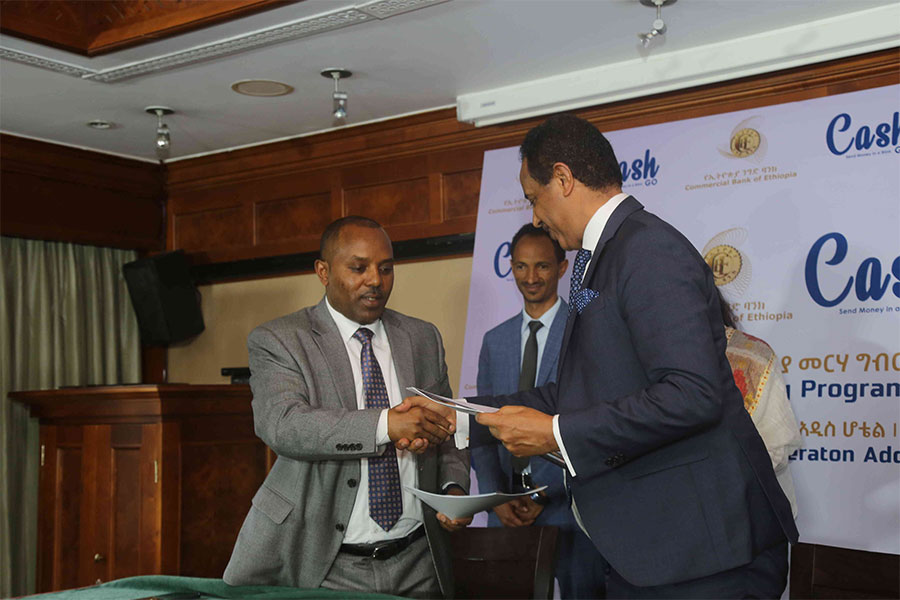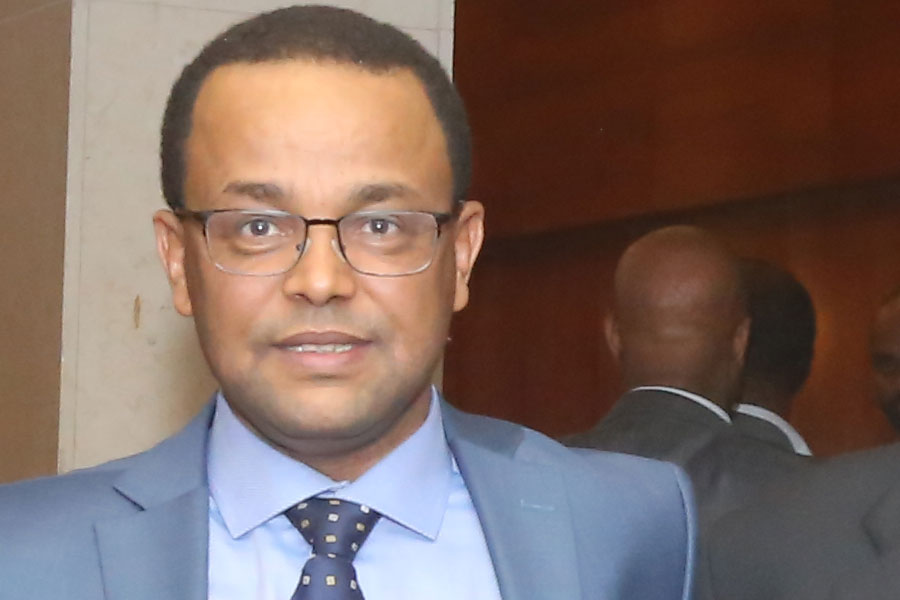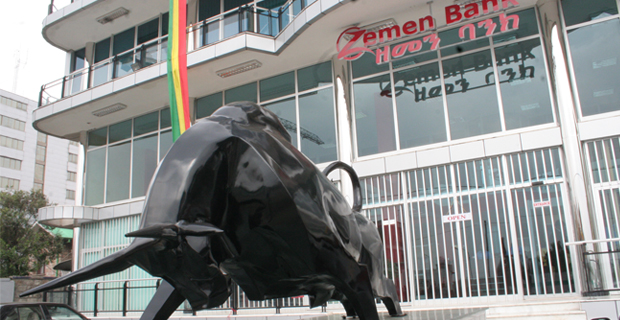
Radar | Oct 31,2020
Feb 19 , 2022
By RUTH TAYE (
FORTUNE STAFF WRITER
)
Awash Bank looks to catch up to its peers in the digital banking arena through its new mobile wallet, Awash Birr, and adopting a "super-agent model" to expand its electronic reach.
Awash, which started operations in 1995 with 24.2 million Br in equity raised from 486 shareholders, is the most capitalised private bank and the only one with a paid-up capital exceeding the minimum threshold capital of five billion Birr set by the central bank last year. The first private bank incorporated following the domestic liberalisation of the financial sector almost three decades ago, Awash serves over six million customers.
Nonetheless, Awash Bank has not been on the lead in the digital and technological fronts among its peers. Dashen and Abyssinia banks have advanced in acquiring cutting edge technologies, introducing digital wallet platforms years ago.
Awash Bank uses an Unstructured Supplementary Service Data (USSD) service and mobile banking solution, registering 3.6 million customers. It transacted about 1.5 billion Br annually through its USSD service, most of which came from Ethiopian Airlines ticket sales and telecom payment services. The digital wallet platform it launched last week offers features such as mobile top-up, cash-in and out, balance inquiry, money transfer, and payment options for airline tickets, cable TV, and school fees.
The services are available in six languages, including Amharic, Afaan Oromo, and Somali.
The wallet charges one Birr for each balance inquiry request, while withdrawals and transfers cost between two and six Birr depending on the amount. Based on the agent banking directive issued two years ago, daily transactions through mobile banking and wallet services cannot exceed 6,000 Br. Abyssinia charges five Birr for every transaction of 1,000 Br.
The wallet is available in a USSD programme, which can be used on non-smartphones and Android and iOS operating systems applications.
Close to 1,300 agents and 680 branches serve Awash as agents, while 4,100 merchants and 590 schools in Addis Abeba and other regional states accept payments through Awash Birr.
“Awash is working to remain competitive in the digital banking sphere, devising a digital finance strategy developed by international experts,” said Tsehay Shiferaw, president of Awash Bank.
Last year, Awash struck a deal with Rays Microfinance. This institution has a large presence in the Somali Regional State, establishing interoperability and enabling Awash to use Rays' mobile money service Sahay.
Incorporated in 2014 with a paid-up capital of 10 million Br, Rays manages Sahay, which has grown to include over 2,400 agents and 10,000 merchants on top of over half a million users since its launch in February 2020.
Agent banking services are relatively new to the industry. They were first introduced following a central bank directive issued in 2012, with Dashen, Hibret and Lion banks among the pioneers in the field.
Since the decade, banks have introduced dozens of mobile wallets bundled with agent banking, including Abyssinia and the Commercial Bank of Ethiopia (CBE). The state-owned giant has the most extensive network with 25,000 agents and over 5.5 million customers. Another state-owned mobile money service provider, Ethio telecom, which launched Telebirr a year ago, had 11 million active users, over 7,000 merchants and 25,000 agents by last November.
However, the figures are a fraction of what M-PESA, a Kenya-based mobile money service provider, has managed to achieve over 15 years of operation. Owned by Safaricom, M-PESA operates with 200,000 agents and 300,000 merchants.
Expanding agent networks has been a challenge, according to Cepheus Capital, a private equity company that has carried out mapping on Ethiopia's digital ecosystem.
Cepheus report reads: "It remains to be seen whether new entrants can sufficiently address the complex logistical and incentive schemes needed to make agent networks achieve large scale, high volumes, and active usage."
Awash Bank looks to introduce a "super-agent model" to get ahead. It consists of agreements with companies that already have extensive networks in place.
“The Bank is working to onboard gas stations and postal services as super agents,” said Kefyalew Shiferaw, deputy chief digital banking operations officer at Awash Bank.
The directive issued by the central bank two years ago permits such a working arrangement.
Ethio telecom had been utilising the "super-agent model" even before the launch of Telebirr. Highlight Trading, incorporated in 2008, has served as a super agent for the state-owned Ethio telecom since 2019, selling electronic vouchers, airtime and providing SIM card services through over 5,200 agents under its wing.
Dawit Teka, founder and chief executive officer (CEO) of the company, observes the model is a useful tool to reach greater segments of society.
Awash Bank has made a deal to incorporate water and electricity bill payments, Tsehay disclosed. Only Telebirr and the CBE have integrated their systems with the Addis Abeba Water & Sewerage Authority. The CBE and Telebirr have partnered with Ethiopian Electric Utility, while the Cooperative Bank of Ethiopia (though E-birr) has struck a deal to facilitate water bill payments in the Oromia Regional State.
Agent banking models are widely encouraged to allow service providers to expand quickly without opening a bank branch, which can be costly and time-consuming. Banks run a branch network of over 7,300. In contrast, a few agent banking services well surpass the number. Still, financial inclusion remains below 40pc.
Users and implementers often misunderstand the concept of mobile wallets, says Tewodros Tassew, a financial technologies consultant. He believes that many banks fail to distinguish mobile banking from mobile wallets, limiting success.
A mobile wallet is independent of the banks or mobile operators; it can be used anywhere where credit cards are acceptable and replace physical wallets.
Mobile wallets are more practical for unbanked populations in rural areas and not for the banked population settled in urban centres, according to Tewodros.
"It's obscure what services mobile wallets offer in addition to regular banking services," he says. "Banks need to come up with unique systems."
PUBLISHED ON
Feb 19,2022 [ VOL
22 , NO
1138]

Radar | Oct 31,2020

Radar | May 11,2019

Radar | Oct 03,2020

Radar | Apr 08,2023

Sponsored Contents | Aug 16,2021

Fortune News | Jul 06,2025

Fortune News | Dec 27,2018

Fortune News | Apr 09,2022

Sponsored Contents | May 03,2022

Covid-19 | Apr 03,2020

Dec 22 , 2024 . By TIZITA SHEWAFERAW
Charged with transforming colossal state-owned enterprises into modern and competitiv...

Aug 18 , 2024 . By AKSAH ITALO
Although predictable Yonas Zerihun's job in the ride-hailing service is not immune to...

Jul 28 , 2024 . By TIZITA SHEWAFERAW
Unhabitual, perhaps too many, Samuel Gebreyohannes, 38, used to occasionally enjoy a couple of beers at breakfast. However, he recently swit...

Jul 13 , 2024 . By AKSAH ITALO
Investors who rely on tractors, trucks, and field vehicles for commuting, transporting commodities, and f...

Jul 5 , 2025
Six years ago, Ethiopia was the darling of international liberal commentators. A year...

Jun 28 , 2025
Meseret Damtie, the assertive auditor general, has never been shy about naming names...

Jun 21 , 2025
A well-worn adage says, “Budget is not destiny, but it is direction.” Examining t...

Jun 14 , 2025
Yet again, the Horn of Africa is bracing for trouble. A region already frayed by wars...